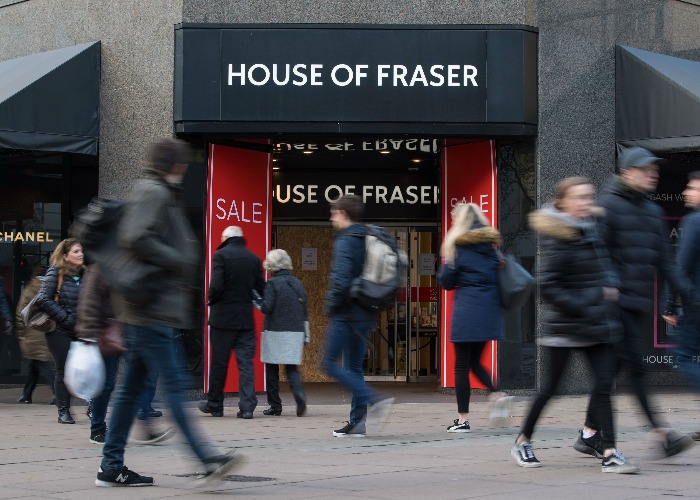Why I finally got a credit card

After years of happily saying no to credit, I was shocked to realise that it could help me get on the housing ladder.
For as long as I can remember, I have always thought credit cards were bad. It has been drummed into me from my youth that any form of debt is the devil.
As a result, I lead a financially savvy but also financially anxious life.
I don't take risks, and when I received a small and unexpected inheritance from a distant relative, I took the risk to open a Stocks and Shares ISA, but that's as wild as my money behaviour gets.
And all of this has meant that I have avoided having to take out loans or getting a credit card, until now.
My financial goals
Like over half of millenials who are currently renting, I want to get on the property ladder.
I don't want to end up among the one in three millennials who will never own their own home, as predicted by the Resolution Foundation.
At times over the past few years, it has felt almost helpless to save for it.
But, I haven't given up and am now fortunate to be on the way to having a small, but viable deposit. I am very lucky that the dream of a mortgage on a small property – especially if I go in with a partner – feels within reach in the next decade.
So, when I have listened to horror stories from friends where a credit card led to them freefalling into debt, I have been thankful that I hadn't needed to go down this route, just to have an extra holiday or to buy a car.
Why would I put my homeownership plans at risk for a piece of plastic?

No credit history spells no mortgage
However, after looking into what I need for a mortgage, I've realised that a credit card might be a necessary evil.
Lack of credit history can actually lead to a rejected mortgage application.
Aaron Strutt, communications director at mortgage brokers Trinity Financial Group, blames banks that are "credit score focused" for this.
"It should be credit searching rather than credit scoring. But some [banks] are very reliant on credit scoring services like Experian to find out everything about you.
"If you don't have a credit card, have no loans, and aren't on the electoral roll, and you have a high loan-to-value rate which means a small deposit, you may struggle to pass a mortgage application."
I am someone who falls into all except one of these categories – I am on the electoral roll – despite only ever making decisions to be financially secure.
It's undeniably frustrating that saving for a deposit and staying out of debt may not be enough for me to become a homeowner. But it also shows that getting a credit card may be one of the easiest ways for me to rectify the situation.
Paying for a holiday? Use your credit card
Other credit benefits
But being able to get a mortgage isn't the only benefit of having a credit card. Until now, when I have wanted to buy a high-value item over £100 I have turned to my dad and his credit card.
On several occasions, I have asked him to pay for flights and an Airbnb before paying him back, so that I would be able to benefit from the protection under Section 75 of the 1974 Consumer Credit Act that credit cards offer on purchases from £100 up to £30,000.
This means that you can turn to the credit provider if something goes wrong, such as if the items are defective or the company collapses. In essence, in some instances, the buyer – me – won't be out of pocket.
Given that major stores do and have recently collapsed, such as House of Fraser, this is a very attractive benefit.

Not just any card
I may want a credit card, but I don't really want to get in debt. I plan to pay off whatever I spend on it each month before accruing interest, and so the APR doesn't overly concern me.
I would like a card that has 0% on purchases for a long period – many offer 18 months or more – so that I can use my card on all purchases, and then be able to keep my savings in my savings account for longer.
The problem is, as someone with a limited credit history, I knew I wasn't going to get approved for many of the best credit cards.
Most of those 'platinum' and 'elite' cards, with all their promises of cashback and airport lounge access, are simply out of reach.
That doesn't mean you have to get a bad credit card, you just need to be careful, and if possible use a free 'soft' search to work out your chances of being approved before you apply.
Just avoid making multiple unsuccessful applications, which will harm your credit score and make it even harder to get approved.
Use a soft search to work out your chances of being approved for credit cards
Choosing the right card
I initially turned to Nationwide, because I already have my main bank account with them.
Their card for existing Nationwide customers has 0% on purchases for 12 months, with fee-free purchases abroad.
But, I wanted to shop around to see if there was a card out there that offered me more than just convenience.
I started to look into store cards after speaking to a friend who had benefited from store vouchers after getting a Marks & Spencer credit card and receiving £20 in M&S points on their first spend (within 90 days) and a £5 voucher when they received the card.
While M&S didn't appeal to me, the John Lewis and Waitrose Partnership Card did.

Not only did it offer £30 of free vouchers if I spent more than £250 in the first 90 days of having the card, but as well as the other benefits of credit the Partnership Card allows you to earn points as you shop.
I would earn one point for every £1 spent in John Lewis or Waitrose, and one point for every £2 spent elsewhere. These points would then be turned into John Lewis and Waitrose vouchers.
A reward scheme that would allow me to generate money to spend in shops I actually like greatly appealed, and so I applied for the Partnership Card.
To make the decision easier, applying for the Partnership Card was a fairly painless process, involving an intuitive online form.
Now that I have my credit card I don't plan to change my financial behaviour dramatically. I am still going to be cautious, and am only using my credit card on larger purchases. It isn't a card that I use every day.
But when I do use it it's a great feeling to know that it is going to help me buy my first home one day.
Click here for our full guide on Mastering Money in your 20s, packed with useful tips
Comments
Be the first to comment
Do you want to comment on this article? You need to be signed in for this feature